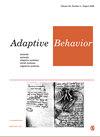实践、行动主义和生态心理学
IF 1.3
4区 计算机科学
Q4 COMPUTER SCIENCE, ARTIFICIAL INTELLIGENCE
引用次数: 2
摘要
经验过程框架(CEF)为认知科学的具体和主动方法提供了一条有前途的道路。它的目的是通过在实践中建立认知基础,为表征渴望活动提供一个全面的解释。实践不仅是我们达到目的的手段,而且是认知的组成部分。然而,令人费解的是,CEF开始发展一种分布式的认知方法,通过观察个体的文化认知生态或环境,然后将焦点转移到对行为主体的内部主义解释上。CEF认为,主体通过实践创造了他们的世界,并发现了他们自己,但却没有提供关于有机体与环境相互关系的清晰解释。这是有问题的,因为CEF的实践概念依赖于其第一个核心假设中的生物-环境相互关系。低估环境重要性的倾向可能是由于早期环保主义思想的延续,这些思想在过去引发了生态心理学和环保主义之间的紧张关系。我们试图将CEF与活动项目重新结合起来,我们认为活动项目正在逐渐从个人主义的概念(如自创生和意义创造)转向社会和生态的概念(如参与性意义创造和支持)。本文章由计算机程序翻译,如有差异,请以英文原文为准。
Practice, enactivism, and ecological psychology
The Course-of-Experience Framework (CEF) represents a promising path forward for embodied and enactive approaches to cognitive science. It aims to provide a comprehensive explanation of representation-hungry activities by grounding cognition in practice. Practice is not merely something that we do as a means to an end, but is constitutive of cognition. Puzzlingly, however, the CEF begins to develop a distributed approach to cognition by viewing individuals through their cultural-cognitive ecology or milieu, before shifting focus to an internalist interpretation of enactive agency. CEF states that the agent enacts their world and discovers themselves through practice, but provides no clear account of organism-environment mutuality. This is problematic because CEF’s notion of practice depends on organism-environment mutuality in its first core assumption. The tendency to downplay the importance of the environment is likely due to a holdover of early enactivist ideas that have sparked tensions between ecological psychology and enactivism in the past. We attempt to re-align the CEF with the enactive project, which we think is gradually shifting away from individualistic concepts like autopoiesis and sense-making toward social and ecological concepts like participatory sense-making and affordances.
求助全文
通过发布文献求助,成功后即可免费获取论文全文。
去求助
来源期刊

Adaptive Behavior
工程技术-计算机:人工智能
CiteScore
4.30
自引率
18.80%
发文量
34
审稿时长
>12 weeks
期刊介绍:
_Adaptive Behavior_ publishes articles on adaptive behaviour in living organisms and autonomous artificial systems. The official journal of the _International Society of Adaptive Behavior_, _Adaptive Behavior_, addresses topics such as perception and motor control, embodied cognition, learning and evolution, neural mechanisms, artificial intelligence, behavioral sequences, motivation and emotion, characterization of environments, decision making, collective and social behavior, navigation, foraging, communication and signalling.
Print ISSN: 1059-7123
 求助内容:
求助内容: 应助结果提醒方式:
应助结果提醒方式:


